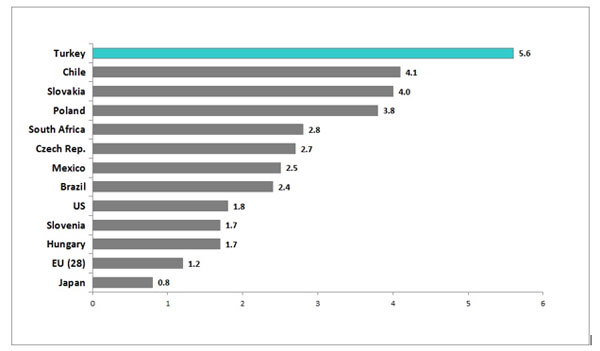Turkey’s economy has performed remarkably well with its steady growth over the past 14 years. A sound macroeconomic strategy, prudent fiscal policies, and major structural reforms have all contributed to the integration of Turkey’s economy into the globalized world while also transforming the country into one of the major recipients of FDI in its region.
These reforms have increased the role of the private sector in Turkey’s economy, enhanced the efficiency and resiliency of the financial sector, and placed public finance on a more solid foundation. These reforms strengthened the macroeconomic fundamentals of the country, allowing the economy to grow at an annual average real GDP growth rate of 5.6 percent from 2003 to 2016.
Annual Average Real GDP Growth (%) 2003-2016

Source: OECD Quarterly National Accounts, 2017
Turkey’s impressive economic performance over the past 14 years has encouraged experts and international institutions to make confident projections about Turkey’s economic future. For example, according to the OECD, Turkey is expected to be one of the fastest growing economies among OECD members during 2015-2025, with an annual average growth rate of 4.9 percent.
Annual Average Real GDP Growth (%) Forecast in OECD Countries
2015-2025 (USD at 2010 PPP)

Source: OECD
Together with stable economic growth, Turkey has also reined in its public finances; the EU-defined general government nominal debt stock fell to 28.3 percent in 2016 from 72.1 percent in 2002. Turkey has been meeting the “EU’s 60 percent Maastricht criteria” for public debt stock since 2004. Similarly, during 2003-2016, the budget deficit decreased from more than 10 percent to less than 2 percent as a ratio to GDP, which is one of the EU Maastricht criteria for the budget balance.
As the GDP levels increased to USD 857 billion in 2016, up from USD 236 billion in 2002, GDP per capita soared to USD 10,807, up from USD 3,581 in the given period.
The visible improvements in Turkey’s economy have also boosted foreign trade. Exports reached USD 143 billion by the end of 2016, up from USD 36 billion in 2002, while tourism revenues, which were around USD 12.4 billion in 2002, exceeded USD 22 billion in 2016.
Significant improvements in such a short period of time have registered Turkey on the world economic scale as an exceptional emerging economy. It is the 17th largest economy in the world and the 6th largest economy when compared with the EU countries, according to GDP figures in 2016.
• Institutionalized economy fueled by USD 180 billion of FDI in the past 14 years
• 17th largest economy in the world and 6th largest economy compared with EU countries in 2016 (GDP, IMF)
• Robust economic growth with an annual average real GDP growth of 5.6 percent during 2003-2016
• GDP reached USD 857 billion in 2016, up from USD 236 billion in 2002
• Sound economic policies with prudent fiscal discipline
• Strong financial structure that is resilient to global financial crises
